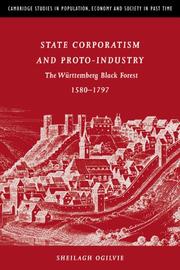| Listing 1 - 4 of 4 |
Sort by
|
Book
Abstract | Keywords | Export | Availability | Bookmark
 Loading...
Loading...Choose an application
- Reference Manager
- EndNote
- RefWorks (Direct export to RefWorks)
Book
ISBN: 9782757204597 2757204599 Year: 2011 Publisher: Paris : Somogy Editions d'art,
Abstract | Keywords | Export | Availability | Bookmark
 Loading...
Loading...Choose an application
- Reference Manager
- EndNote
- RefWorks (Direct export to RefWorks)
Wool fabrics --- Woolen goods industry --- Weavers --- Serge --- Wool --- Wool industry --- Lainages --- Lainages --- Tisserands --- Serge --- Laine --- Laine --- History --- History --- History --- History --- History --- Histoire --- Industrie --- Histoire --- Histoire --- Histoire --- Industrie --- Histoire
Book
ISBN: 9788866870784 Year: 2015 Publisher: Roma : Scienze e lettere,
Abstract | Keywords | Export | Availability | Bookmark
 Loading...
Loading...Choose an application
- Reference Manager
- EndNote
- RefWorks (Direct export to RefWorks)
Textile industry --- Wool fabrics --- Excavations (Archaeology) --- Textiles et tissus --- Lainages --- Fouilles (Archéologie) --- Industrie et commerce --- Heraclea (Italy : Extinct city) --- Magna Graecia (Italy) --- Héraclée de Lucanie (Ville ancienne) --- Grande-Grèce --- Antiquities --- Antiquités

ISBN: 0521372097 0521025842 0511582862 0511003986 9780511003981 9780511582868 Year: 1997 Volume: 33 Publisher: Cambridge New York Cambridge University Press
Abstract | Keywords | Export | Availability | Bookmark
 Loading...
Loading...Choose an application
- Reference Manager
- EndNote
- RefWorks (Direct export to RefWorks)
State Corporatism and Proto-Industry focuses on an industrial countryside in south-west Germany, where a dense worsted industry dominated the rural economy from 1580 to 1800. This is an example of 'proto-industry', the dense, export-oriented rural manufacturing which arose throughout Europe before factory industrialization. But although the Württemberg worsted industry possessed all the features of a classic proto-industry, closer scrutiny throws doubt on basic assumptions about European proto-industrialization. In this book, Sheilagh Ogilvie shows that proto-industries did not break down traditional society. Instead, corporate institutions such as guilds, merchant companies, village communities and manorial systems retained enormous power. This was a result of 'state corporatism': the expanding early modern state granted privileges to favoured groups in return for fiscal and regulatory co-operation. As Ogilvie shows, these corporate privileges profoundly constrained both individual decisions and economic development.
Guilds --- Industrialization --- Municipal franchises --- Weavers --- Woolen and worsted manufacture --- Woolen goods industry --- History. --- Tisserands --- Lainages --- Laine --- Corporations --- Industrialisation --- History --- Histoire --- Industrie --- Wildberg (Baden-Württemberg, Germany) --- Wildberg (Bade-Wurtemberg, Allemagne) --- Economic conditions --- Conditions économiques --- Wildberg (Baden-Württemberg, Alemania) --- Condiciones económicas. --- Industria de la madera --- Alemania --- Wildberg (Baden-Württemberg) --- Historia. --- Condiciones sociales. --- Arts and Humanities --- Economic conditions. --- Social conditions.
| Listing 1 - 4 of 4 |
Sort by
|

 Search
Search Feedback
Feedback About UniCat
About UniCat  Help
Help News
News